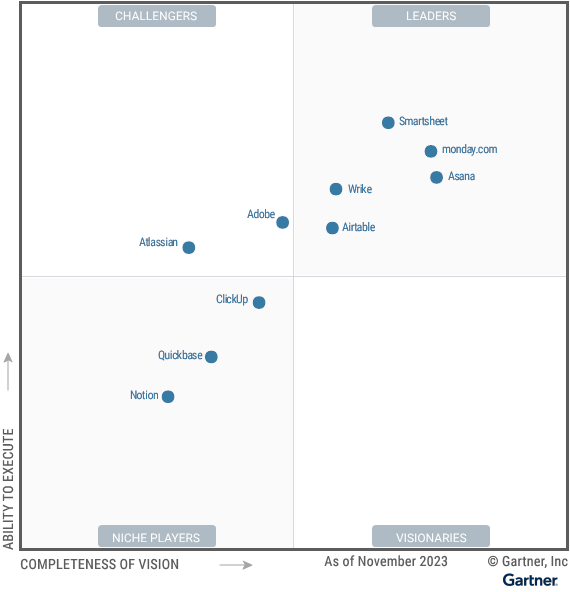A new report from Gartner sizes up the rapidly growing market for collaborative work management (CWM) platforms and evaluates the strengths and weaknesses of the major players. These tools aim to help teams plan projects, coordinate tasks, manage deadlines and automate workflows.
The CWM market has expanded quickly as companies adapt to distributed workforces and seek digital solutions to optimize team productivity. Gartner estimates the market was worth $2.7 billion in 2021 and forecasts 25% annual growth through 2025.
“Demand for these platforms skyrocketed with the shift to hybrid work during the pandemic,” said [Analyst Name], author of the report. “Knowledge workers need to coordinate across locations and time zones, which drives interest in smarter ways to orchestrate business activities.”
The report examines key capabilities like intuitive work planning, built-in collaboration, process automation and analytics. Vendors were assessed on completeness of vision and ability to execute.
Airtable and monday.com Emerge as Top Contenders
Airtable and monday.com lead the pack thanks to user-friendly design, viral adoption among individuals that has carried into enterprises and strong marks from customers.
Airtable “democratizes software creation by giving business users flexibility to build tools aligned to their needs,” [Analyst Name] noted. Its roadmap prioritizes enhancements like resource management and AI-assisted content creation.
monday.com draws praise for visual workflow automation, permissions controls and use case-specific templates. Its near-term goals include third-party app integration and master templates to standardize global deployments.
Other Front Runners Optimized for Common Scenarios
Smartsheet and Wrike also earn “Leader” status for capabilities that accelerate specific workflows. Smartsheet takes a spreadsheet approach suited to program managers while Wrike emphasizes interdepartmental collaboration and offers tailored solutions for marketing and professional services teams.
Asana is a Leader for simplicity that makes it accessible for mainstream business users. Atlassian and Adobe oriented their tools toward technical teams but lag in ease of use.
Underdogs Gain Ground With Strong Niche Strategies
Several underdogs land in the “Niche Players” segment but boast strengths that could make them competitive.
Notion’s notebook-style pages foster freeform collaboration even if work planning isn’t its primary focus yet. Quickbase pitches its low-code platform as an alternative for pro developers to quickly build custom apps.
New Entrant ClickUp Impresses With Broad Capabilities
Also labeled a Niche Player, ClickUp is highlighted as a promising up-and-comer thanks to its surprisingly robust feature set for a relatively young firm.
“It offers a comprehensive set of core CWM capabilities including document creation, whiteboards and universal search,” [Analyst Name] explained. “Its vision aligns well with customer needs in this market.”
As the work landscape evolves, these agile startups are pushing mature vendors to keep sharpening their offerings. With digital transformation accelerating across industries, the marketplace for streamlining team productivity shows no signs of cooling off.


